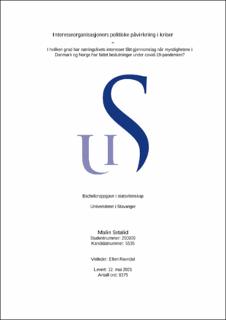| dc.description.abstract | 11. mars 2020 erklærte Verdens helseorganisasjon (WHO) utbruddet av covid-19-viruset for en global pandemi. Danmark besluttet 11. mars 2020 å stenge ned landet og sende alle elever, studenter og offentlig ansatte hjem i to uker. 12. mars 2020 innførte Norge de mest inngripende tiltakene landet har hatt i fredstid. Hensikten med tiltakene var å bremse spredningen og beskytte befolkningen og folkehelsen mot en global, dødelig pandemi. Interesseorganisasjoner for næringslivet har fra begynnelsen av pandemien satt i gang omfattende arbeid for å redde flest mulig bedrifter og arbeidsplasser slik at konsekvensene blir minst mulig.
Interesseorganisasjoners deltakelse og påvirkning i politiske spørsmål er et fenomen som har blitt forsket på ved flere anledninger. Det mangler likevel betydelig data på i hvilken grad næringslivets interesser har blitt ivaretatt i kriser. Formålet med denne oppgaven er å belyse i hvilken grad næringslivets interesser har blitt ivaretatt når myndighetene i Danmark og Norge har fattet beslutninger under covid-19-pandemien. For å undersøke dette har det blitt gjort to case studier på områdene «kompensasjonsordninger til næringslivet» og «stengte landegrenser». Ulike tiltak fattet av myndighetene og tilsvarende høringsinnspill fra interesseorganisasjonene for næringslivet, Næringslivets Hovedorganisasjon (NHO) og Dansk Industri (DI), utgjør det empiriske grunnlaget i oppgaven.
Med bakgrunn i funnene kan vi observere at næringslivets interesser har fått gjennomslag i moderat til høy grad når myndighetene i Danmark og Norge har fattet beslutninger under covid-19-pandemien. Det er tydelig at interesseorganisasjonene har påvirket de endelige tiltakene ved å ta i bruk ulike påvirkningsstrategier i beslutningsprosessene. Ut ifra funnene ser vi at myndighetene har vektlagt næringslivets interesser når de har utformet kompensasjonsordningene. Myndighetene har i mindre grad tatt hensyn til næringslivets interesser når de har valgt å stenge landegrensene. Det observeres likevel her en forskjell mellom Danmark og Norge. Det omfattende arbeidet til interesseorganisasjonene har uten tvil sørget for at konsekvensene av pandemien for samfunnet som helhet vil bli mindre, enn de ville blitt dersom de hadde holdt seg utenfor beslutningsprosessene. | |
| dc.description.abstract | On the 11th of March 2020, the World Health Organization (WHO) declared the outbreak of the COVID-19 virus a global pandemic. The pandemic has affected society to a great extent. On March 11, Denmark decided to close down the country and sent all pupils, students and public employees home for two weeks. A day later, on the 12th of March, Norway introduced the most intrusive measures the country has had in peacetime. The purpose of the measures was to slow down the spread and to protect the population and public health from a deadly, global pandemic. From the beginning, interest groups for business and industry have initiated extensive work to save as many companies and workplaces to minimise the consequences as much as possible.
The participation and influence of interest groups in political issues is a phenomenon that has been researched on several occasions. Nevertheless, there is a significant lack of data on the extent to which business and industry interests has been preserved in crises. The purpose of this thesis is to shed light on the degree to which the interests of business and industry has been preserved when the governments of Denmark and Norway have made decision during the COVID-19 pandemic. To examine this, there have been conducted two case studies in the areas of “compensation schemes for business and industry” and “closed national borders”. Various measures taken by the authorities and corresponding consultation input from the advocacy groups for business and industry, the Confederation of Norwegian Enterprise (Næringslivets Hovedorganisasjon [NHO]) and the Confederation of Danish Industry (Dansk Industri [DI]), constitute the empirical basis in the thesis.
Based on the findings, we can observe that the interests of the business and industry have had a moderate to a high degree of impact when the authorities in Denmark and Norway have made decisions during the COVID-19 pandemic. It is clear that the interest groups have influenced the final measures by applying different influencing strategies in the decision-making processes prior to the decision. Based on the findings, we see that the authorities have emphasized the interests of the business and industry when designing the compensation schemes. However, the authorities have to a lesser extent taken into account their interests when they have chosen to close the national borders. Nonetheless, there is a difference between Denmark and Norway to observe in this regard. The extensive work of the advocacy groups has undoubtedly ensured that the consequences of the pandemic will be less for the society as a whole, than it would have been if they had stayed out of the decision-making processes. | |
